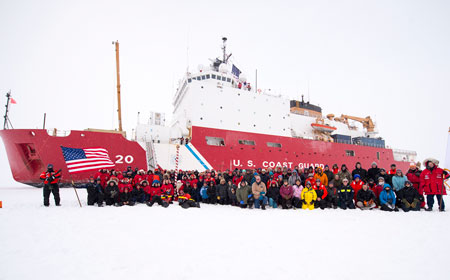
The Healy is the United States’ largest and most technologically
advanced icebreaker as well as the Coast Guard’s largest vessel. She is
classified as a medium icebreaker and serves on missions including search and rescue,
ship escort, environmental protection, enforcement of law and treaties, and scientific
expeditions.
Builder: Avondale ShipyardCommissioned: November 10, 1999Decommissioned:Length: 420 feetBeam: 82 feetDisplacement: 16,000 tonsSpeed: 17 knots (20mph), 3 knots (3.5mph) in 4.5-foot iceIce Capacity: 4.5 feet (continuous), 10 feet (ramming)
Other Characteristics: Healy is an optimally manned vessel – she
has the minimum number of personnel staffed in order to safely navigate. The
ship provides more than 4,200 square feet of scientific laboratory space, numerous
electronic sensor systems, oceanographic winches, and accommodations for up to 50
scientists. Healy can operate in temperatures as low as -50°F.
History: From June through December 2001, Healy mapped 1,100 miles
of the Gakkel Ridge, previous the only unmapped undersea ridge in the world.
Twelve previously unknow volcanoes and numerous hydrothermal vents were discovered.
From April 2007 to July 2008, Healy conducted a project to evaluate the entire ecosystem
of the Bering Sea. Data collected during these missions helped improve the understanding
of food webs and biological communities in the Arctic. In August and September
2009, Healy pushed 150 miles further north than planned and acquired over
1,000 pounds of geological samples. On September 5, 2015, Healy became
the first unaccompanied U.S. surface vessel to reach the North Pole. During
that mission, she traveled over 16,000 miles and took over 25,000 water and ice samples
from 72 science stations.
